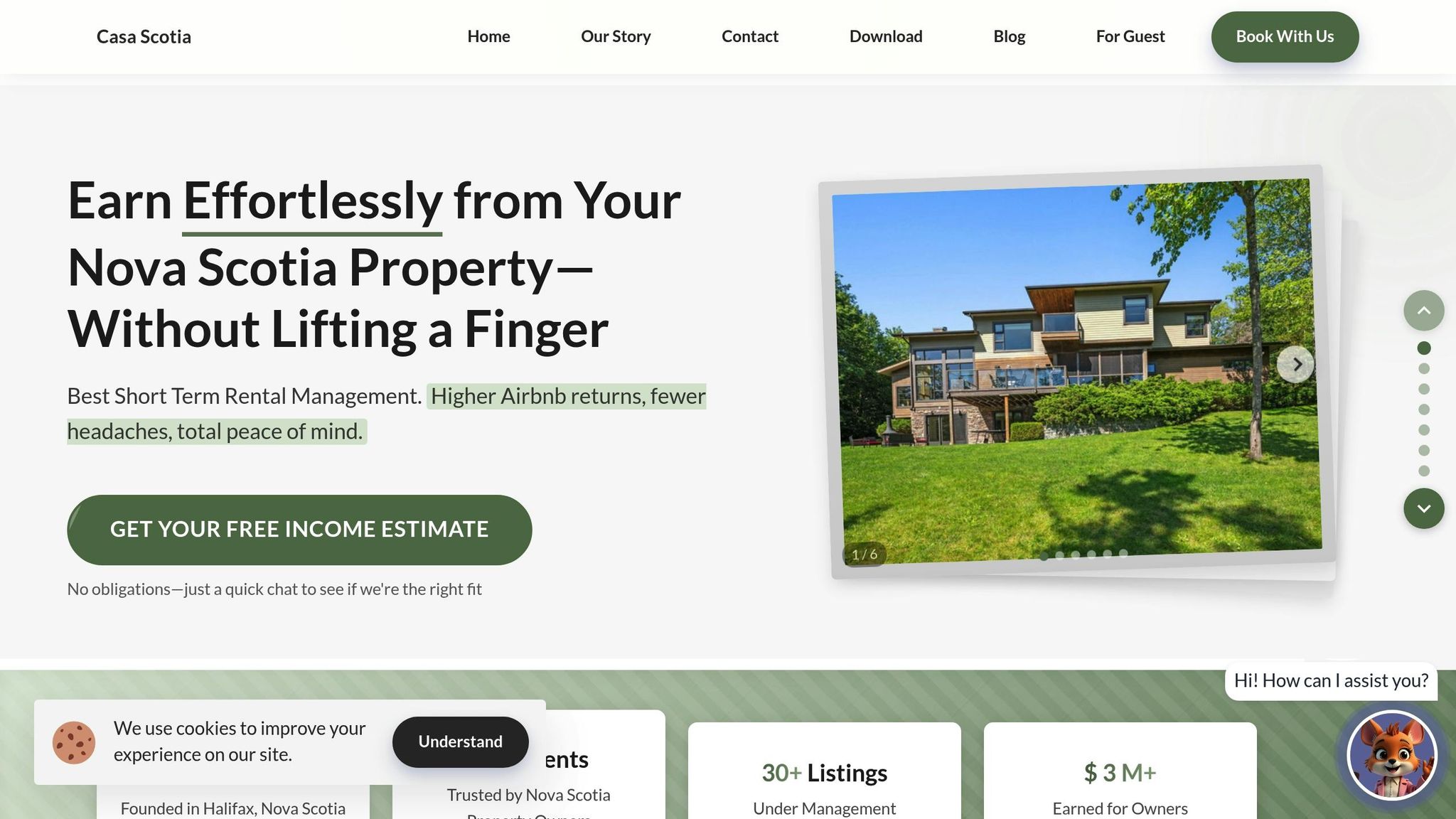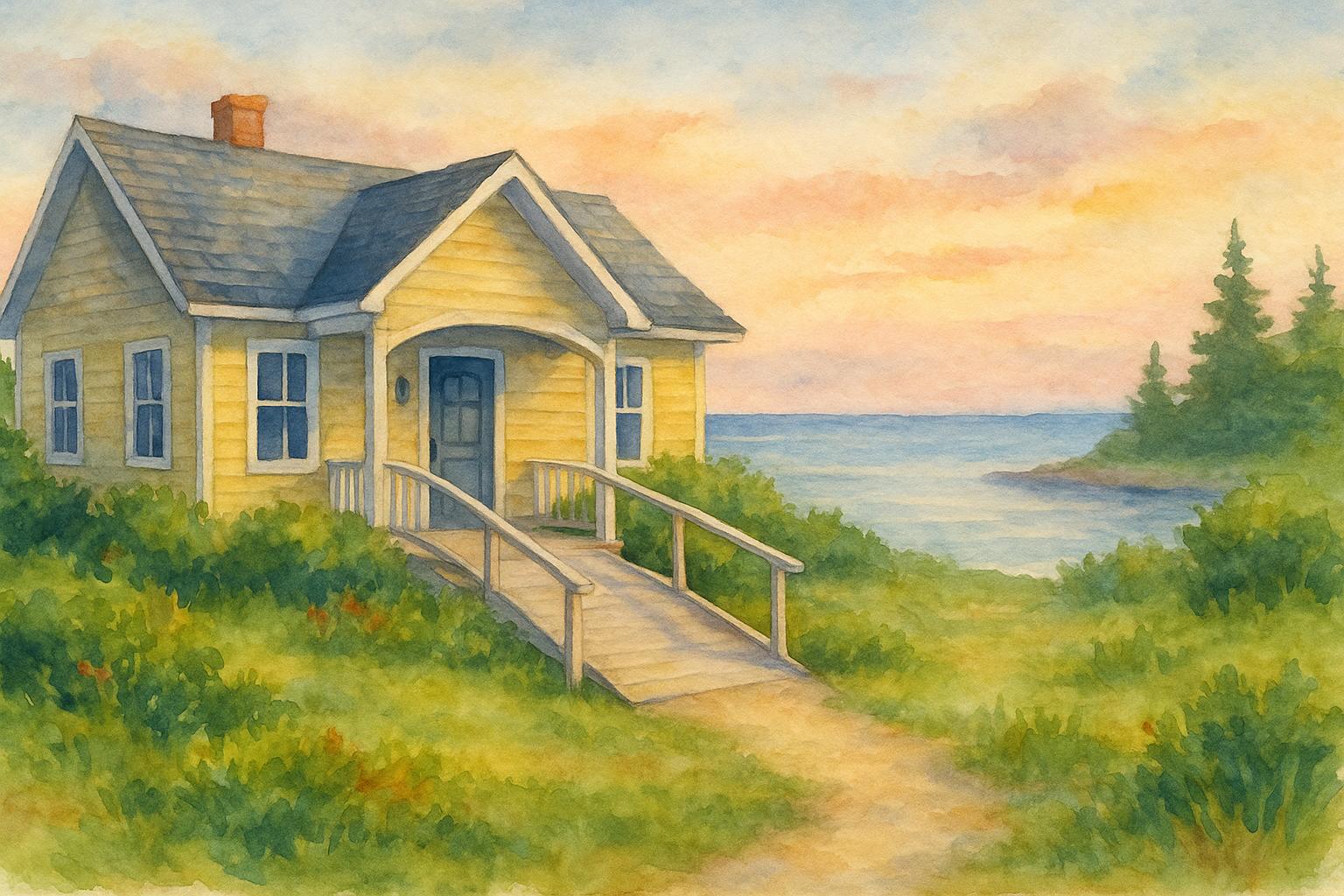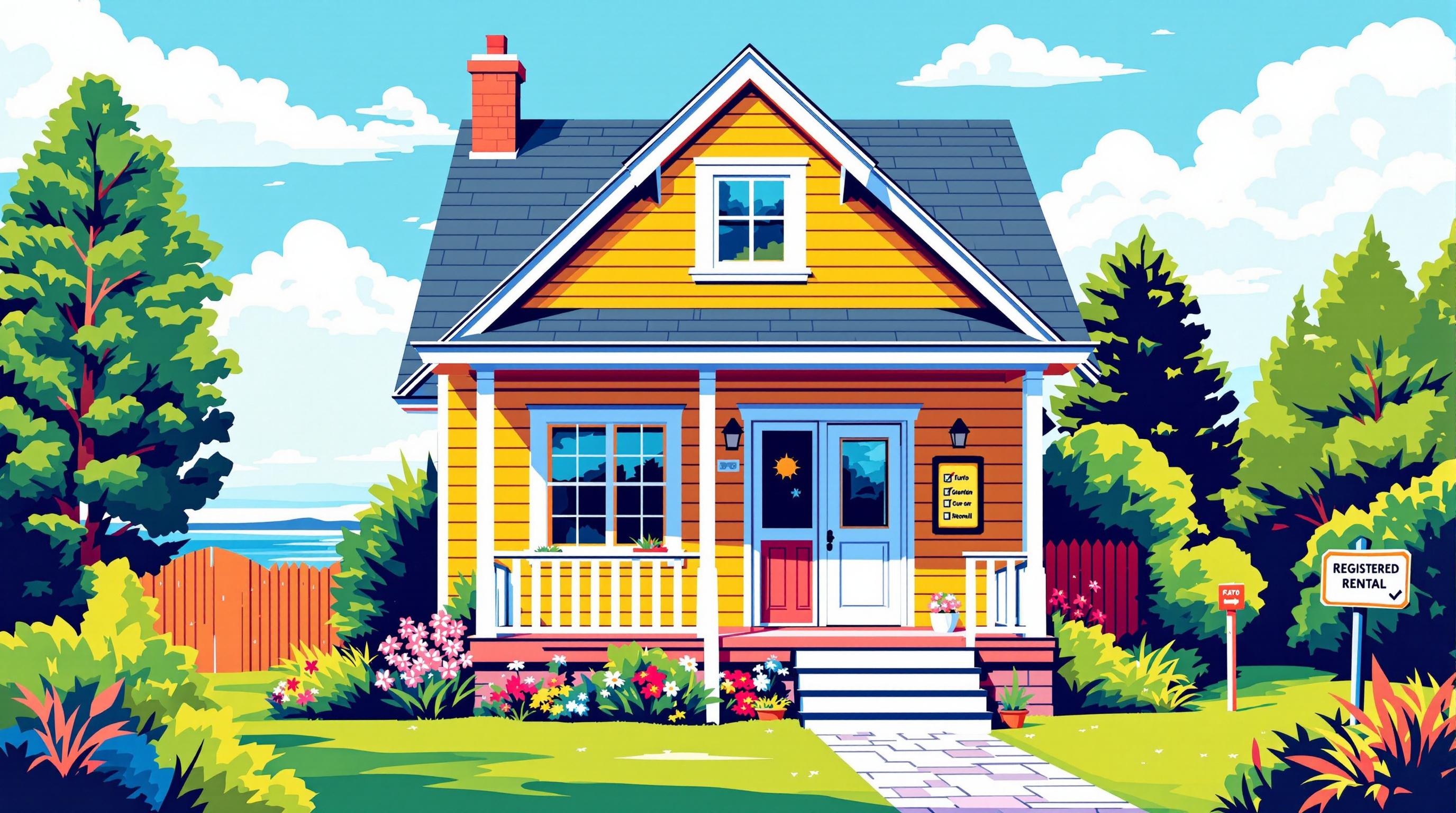Looking to rent or run off-grid cabins near Halifax Regional Municipality (HRM)? Here's what you need to know:
- Why They’re Popular: Guests crave nature escapes, eco-conscious stays, and digital detoxes. Nova Scotia’s scenic landscapes make off-grid cabins a top choice for locals and tourists alike.
- Challenges for Owners: Remote locations require self-sufficient systems - solar power, rainwater collection, and composting toilets. Maintenance, seasonal access, and managing guest expectations are critical.
- Regulations: Zoning, building permits, and compliance with water, sewage, and electrical standards are non-negotiable. Ignoring these can lead to fines or safety issues.
- Energy & Waste Solutions: Solar power, battery storage, and efficient heating systems ensure comfort. For waste, composting toilets are cost-effective, while septic systems offer familiarity.
- Guest Comfort: Visitors want a balance of rustic charm and basic comforts like hot showers, reliable power, and clear instructions for off-grid living.
Key Tip: Professional property management services, like Casa Scotia, can simplify operations, handle maintenance, and ensure smooth guest experiences.
Running off-grid cabins near HRM is rewarding but requires preparation, compliance, and reliable systems. Done right, you’ll offer guests a memorable escape while maintaining a smooth operation.
How to live off grid: no well or septic, how we manage food, water, power, trash, & waste +bloopers
Regulations and Compliance for Off-Grid Cabin Rentals
Renting out off-grid cabins near HRM comes with a host of municipal and provincial regulations, including building codes, environmental guidelines, and safety standards. Tackling these requirements early can save you from expensive fixes and legal headaches down the line. This section dives into zoning rules, utility compliance, and common legal traps to watch out for.
Zoning and Permits for Rural Properties
First things first - check the zoning regulations for your property. Many rural areas near HRM are zoned for agricultural or resource use, which might not automatically permit short-term rentals. If you’re planning to convert a seasonal cabin into a rental, you’ll likely need a permit to change the property’s designated use.
Building permits are also a must for new construction or major renovations. Even if your cabin isn’t connected to municipal services, it still has to meet Nova Scotia’s building code. Things like occupancy limits and fire safety measures will depend on the cabin’s size and the capacity of its systems. If your property is in an environmentally sensitive area, you may need additional permits or zoning adjustments.
Water, Sewage, and Electrical System Compliance
Water safety is a priority, and the rules depend on your water source. If you’re using a private well, it must be tested, certified, and regularly monitored for quality. Rainwater collection systems are another option, but they need to meet provincial health standards. This means properly filtering and treating any water used for drinking, cooking, or bathing.
Sewage systems are another area where compliance is non-negotiable. Installing a new septic system? You’ll need soil testing, a professional design, and the right permits. If you’re using composting toilets, they must meet the province’s on-site sewage disposal regulations.
Off-grid electrical systems also have strict safety requirements. Whether you’re installing solar panels, generators, or battery storage, the work must meet safety standards and be done by licensed professionals. Proper inspection and certification are crucial to ensure everything is up to code.
Common Legal Pitfalls to Avoid
Insurance is one area where many off-grid cabin owners run into trouble. Standard policies often don’t cover off-grid rentals, so you’ll need a specialized policy, which might come with higher premiums and additional inspections.
Environmental compliance is another big one. Greywater disposal systems, for example, must meet specific standards to avoid fines and violations. Noise bylaws can also come into play, especially if you’re using generators - many areas have restrictions on operating hours to reduce disturbances.
Don’t forget about access roads. If your cabin is in a remote area, maintaining access might require working with neighbouring property owners or investing in road improvements. Also, changing your property’s classification from residential to commercial use could lead to higher property taxes and additional licensing requirements.
The best way to stay ahead of these challenges? Connect with your municipal planning department and seek advice from local experts. This proactive approach will help you navigate the regulatory maze and keep your rental compliant, all while ensuring a smooth experience for your guests.
Energy Solutions for Off‑Grid Living
Once regulatory compliance is sorted, the next big step in off-grid living is tackling energy management. Powering an off-grid cabin near HRM requires a thoughtful approach to balance reliability, cost, and environmental considerations. Nova Scotia’s ever-changing weather adds complexity, with reduced solar energy during cloudy days and shorter winter daylight hours. To overcome these hurdles, combining multiple energy sources that adjust to seasonal shifts can maintain guest comfort while ensuring consistent power.
Solar, Wind, and Generator Systems: Pros and Cons
Solar power is a solid option, although its efficiency drops during winter. Wind power can fill in some gaps, but it needs regular upkeep and careful placement to avoid disturbing the cabin’s peaceful atmosphere.
When renewable energy sources fall short - particularly in harsh winter months - propane generators step in as a dependable backup. They’re especially useful for critical functions like heating and hot water, ensuring the cabin remains functional during energy shortfalls.
Energy Storage and Backup Power Strategies
Energy storage is key for any off-grid setup, given the variable output of renewable sources. Modern battery systems, designed to perform well even in cold conditions, can store energy effectively when paired with the cabin’s specific needs. To prepare for extended periods of low energy production or unexpected outages, it’s wise to maintain adequate fuel reserves for backup generators.
Smart energy management systems can make a world of difference. These systems monitor energy production and usage, helping to optimize power distribution. For guests unfamiliar with off-grid living, they simplify operations and ensure a smooth experience.
Energy‑Efficient Appliances and Heating Choices
Heating often accounts for the largest slice of energy use, so investing in efficient heating systems is crucial. High-efficiency wood or pellet stoves are a reliable way to keep the cabin warm while using less energy and producing fewer emissions.
For year-round comfort, mini-split heat pumps are a great option, providing both heating and cooling with impressive efficiency. Choosing energy-efficient appliances also makes a significant impact - look for refrigerators designed for low power use and consider induction cooktops for cooking. Switching to LED lighting and adding smart features like motion sensors or automated switches can further cut down on unnecessary energy consumption. Finally, selecting the right hot water system - whether it’s a tankless model or a heat pump water heater - ensures a balance between energy efficiency and guest satisfaction. This thoughtful approach not only reduces energy demands but also guarantees a comfortable and enjoyable stay for guests.
Water Supply and Waste Management in Remote Cabins
Water and waste systems are the backbone of off-grid cabin life. Managing them properly not only prevents unexpected breakdowns but also ensures a smooth and comfortable stay for guests venturing into remote areas near HRM.
Water Sourcing Options: Wells, Rainwater, and Filtration
Finding a reliable water source is just as important as handling waste effectively. Here are three common options to consider for remote cabins:
- Wells: A well taps into groundwater, offering a steady supply of water. While the upfront cost can be steep, regular water testing is essential to ensure safety.
- Rainwater Harvesting: This method can complement your primary water source. With the right setup - gutters, first-flush diverters, and covered storage tanks - you can collect a substantial amount of water. However, freezing temperatures in colder months can disrupt collection.
- Multi-Stage Filtration: Combining sediment filters, carbon blocks, and UV sterilization ensures safe drinking water. Regular maintenance of the filtration system is crucial to keep it functioning properly.
Waste Management: Septic Systems vs. Composting Toilets
When it comes to waste management, your choice between a septic system and composting toilets will affect both your budget and the guest experience. Each option has its pros and cons, as outlined below:
| Feature | Composting Toilets | Septic Systems |
|---|---|---|
| Water Usage | Minimal or no water use, saving over 6,600 gallons per person annually [1] | Requires water for flushing - 27% of household water use [1] |
| Installation Cost | Starting at $1,400 for self-contained units [1] | Up to 75% more expensive due to excavation and plumbing [1] |
| Maintenance | Requires regular emptying and adding carbon materials | Needs pumping every 3–5 years, with minimal ongoing upkeep [4] |
| Environmental Impact | Produces compost and reduces landfill methane [1] | Risk of groundwater contamination if not maintained [2] |
| Guest Acceptance | May need guest education on usage | Familiar experience akin to traditional toilets |
| Suitability | Ideal for remote or water-scarce areas [2][3] | Best for permanent setups with ample space [2] |
Composting Toilets: These systems are perfect for smaller cabins or locations where septic installation isn’t feasible. Guests will need to add carbon-rich materials like sawdust or peat moss after each use, and the system should be emptied a few times a month during busy periods. Proper ventilation is key to keeping odours at bay.
Septic Systems: Septic systems provide the traditional flush-toilet experience most guests are accustomed to. They can handle waste from multiple guests efficiently, provided there’s enough room for the tank and drain field. While the initial cost is higher, the lower maintenance requirements and convenience make them a practical long-term solution.
Maintenance Tips for Effective Waste Management
Choosing the right system is only half the battle - consistent maintenance is what keeps things running smoothly.
- For Composting Toilets: Maintaining the right balance of carbon and nitrogen is essential. Guests (or cabin owners) should add carbon-rich materials after each use. Keep an eye on temperature, moisture levels, and ventilation in the composting chamber to avoid odours and ensure proper decomposition. During peak usage, plan to empty the system every 2–4 weeks.
- For Septic Systems: Avoid overwhelming the system by spacing out water-heavy tasks like laundry or dishwashing. Fix leaking taps quickly - just one dripping faucet can waste up to 10,000 litres of water annually [4]. Schedule professional inspections yearly and pump the tank every three to five years to prevent issues.
Providing clear and friendly instructions for guests can go a long way in ensuring these systems are used correctly. A well-maintained water and waste setup not only minimizes disruptions but also enhances the off-grid experience, offering guests the sustainable and comfortable escape they’re looking for.
sbb-itb-b5e1074
Meeting Guest Expectations in Off-Grid Cabins
Guests may come to off-grid cabins yearning for peace and a break from urban chaos, but that doesn’t mean they’re ready to give up modern comforts. A reliable power source is often at the top of their list - whether it’s for keeping the lights on, charging their devices, or running appliances. Balancing the charm of off-grid living with the convenience of modern amenities is key to creating an experience that leaves guests happy and eager to return.
Required Amenities for Guest Comfort
Streamlining Operations with Professional Support
Running an off-grid cabin rental near HRM comes with its fair share of challenges - cleaning, maintenance, and guest communication are just the tip of the iceberg. To keep everything running smoothly and ensure guests have a great experience, professional support becomes a key ingredient. It’s what connects the dots between the logistical hurdles of remote properties and the seamless stays your guests expect.
Take cleaning, for example. Your team needs to be familiar with the quirks of off-grid systems, like maintaining solar power setups, managing composting toilets, and handling unexpected hiccups, such as a water pump failure. And let’s not forget the unpredictable rural roads - spring thaws or heavy rains can make them nearly impassable, making experienced service providers essential.
Professional property management services can step in to handle these complexities. They take care of supply logistics, occupancy management, and changeovers, ensuring operations stay on track. Whether it’s a generator that won’t start or solar batteries needing a reset, having a responsive team ready to tackle issues quickly keeps guest disruptions to a minimum.
Casa Scotia's Hands-Free Management Solutions

Enter Casa Scotia, a company that has fine-tuned its services to address the unique operational challenges of off-grid rentals. Their hands-free management solutions are designed to simplify your workload while adapting to the realities of running a remote property.
One standout feature is their dynamic pricing tools, which help maximize revenue - even during the slower off-peak seasons when off-grid properties might otherwise sit idle. They also have a thorough guest screening process, ensuring visitors are fully prepared for the off-grid experience before they even arrive.
Casa Scotia provides a dedicated owner portal that delivers real-time updates on occupancy, maintenance needs, and system alerts - an invaluable resource when quick action is needed to prevent small issues from escalating. They also offer monthly financial reports, giving you clear insights into the costs and returns of your rental. Plus, their compliance monitoring ensures your property meets local regulations, whether it’s septic system standards or electrical safety requirements.
Their management plans are flexible to suit different needs. If your main focus is the high-earning summer months, their Peak-Season Management option is ideal. For those looking to generate income year-round, their Year-Round Management plan leverages mid-term rental strategies to keep revenue flowing during quieter times.
Benefits of Using Local Expertise for Off-Grid Rentals
When it comes to managing off-grid properties, local expertise is a game-changer. Professionals based in rural Nova Scotia have a deep understanding of the region’s unique challenges. They know which roads are likely to flood during spring runoff, where to quickly source replacement parts for well pumps or solar inverters, and how to spot potential issues before they impact your guests.
Local know-how also comes in handy for navigating permitting processes and coordinating with reliable contractors. These experts ensure guest communications are clear and set realistic expectations for the off-grid experience, creating a smoother operation for both owners and visitors alike.
Conclusion: Balancing Environmental Impact and Guest Satisfaction
Running successful off-grid cabin rentals near HRM is all about finding the sweet spot between sustainability and guest comfort. Today’s travellers want eco-friendly getaways that don’t skimp on the comforts they’re used to.
One key to achieving this balance is clear communication. The term off-grid can mean different things to different people. For some, it might evoke images of complete self-sufficiency, while others may expect a mix of eco-conscious initiatives and modern conveniences. Setting clear expectations about what off-grid means for your cabin can go a long way in ensuring happy guests and glowing reviews.
To meet these expectations, reliable systems are essential. Solar panels, battery storage, and effective water and waste management should seamlessly support the amenities offered. By integrating sustainable systems with well-defined standards, you create a solid foundation for smooth operations.
Of course, even the best systems need the right people to keep everything running smoothly. Professional management plays a critical role here, especially in remote areas. Companies like Casa Scotia offer hands-free solutions, handling everything from dynamic pricing during peak seasons to maintenance tailored to the unique challenges of rural Nova Scotia. This kind of expert support allows you to focus on growing your business while ensuring day-to-day operations are handled with care.
Ultimately, success in off-grid rentals boils down to authenticity and preparation. Guests choose these stays to unplug from city life and reconnect with nature, but they also expect reliable systems and guidance to make the experience enjoyable. By delivering both eco-conscious practices and modern comforts, you can create memorable stays that keep guests coming back.
FAQs
What permits and regulations do I need to follow for off-grid cabin rentals near Halifax?
To run off-grid cabin rentals near Halifax, you’ll need to follow the Short-term Rentals Registration Act. This law requires you to register your property every year, with fees ranging from $50 to $2,000 per unit, depending on the rental’s type and location. You’ll also need to provide supporting documents, including proof that your property complies with municipal bylaws and, if applicable, written consent from property owners or condo boards.
Failing to comply can lead to fines as high as $100,000, so it’s essential to follow all the rules. Make sure your property meets local standards for water, waste, and energy management - especially if your cabins are off-grid. Double-checking these details can save you from costly penalties.
How can I balance guest expectations with sustainable off-grid living in rural cabins near HRM?
To meet guest expectations while embracing sustainable off-grid living, start by being upfront about your property's features in your listing. Mention elements like solar power, composting toilets, or a limited water supply so guests know exactly what they’re signing up for. This level of transparency appeals to travellers seeking eco-conscious stays.
Make sure to provide a detailed guidebook or welcome binder that explains how to use key amenities, such as the shower, stove, or heating system. Include resource-saving tips for water and electricity, and reassure guests about the systems’ reliability. This kind of communication not only prepares guests but also makes their stay smoother and more enjoyable.
Lastly, add thoughtful touches to boost comfort without sacrificing sustainability. Think extra blankets for chilly nights - especially during the winter - or lanterns for additional lighting. These small gestures can leave a positive impression while staying true to your eco-friendly ethos.
What are the best energy options to keep guests comfortable in off-grid cabins year-round?
For off-grid cabins, solar power systems offer a renewable and environmentally friendly energy solution. Pairing these systems with battery storage ensures a steady power supply, even during cloudy days or at night. To meet the higher energy demands of colder months, adding a backup generator or a small wood stove can help maintain a comfortable environment for guests.
Sizing your energy system according to seasonal needs is crucial. For instance, summer typically requires less energy for heating, while winter brings increased demands for heating systems or other appliances. Thoughtful planning guarantees a smooth and enjoyable experience for guests, no matter the time of year.
Related Blog Posts
- Municipal STR Rules Within Two Hours of Halifax: What Changes by Community
- Halifax, Dartmouth, Bedford and Sackville: Where STRs Are Allowed and What Permits You Need
- Head of Jeddore, Sheet Harbour and Taylor Head: Rural STR Compliance and Guest Profiles
- Fall River, Hammonds Plains and Timberlea: Suburban STR Rules and Family Demand



